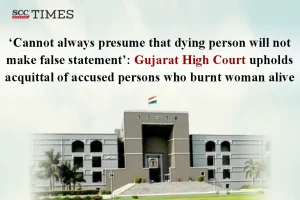Gujarat High Court: In a criminal appeal petition filed under Section 378 of Criminal Procedure Code, 1973 (CrPC), against a judgement dated 24-3-1999, where the accused had been acquitted of offences committed under Sections 302, 294, 452 and 34 of the Penal Code, 1860 (IPC), the Division Bench of Vaibhavi D Nanavati* and Utkarsh Thakorbhai Desai, JJ, upheld the trial court’s order acquitting the persons accused of burning a woman alive. The Court stated that it cannot presume that in all cases, a dying person won’t make a false statement. A person cannot be convicted on the basis of a dying declaration which is doubtful of being voluntary and truthful and is not corroborated by any evidence.
Background
A woman was alleged to have been burned alive by her sisters-in-law and brother-in-law (the husband of one of the sisters-in-law). On the day of the incident, the woman’s husband had gone for labor work in the morning, and the woman was plastering her house with cow dung. Accused 1, 2 and 3 had arrived at her house and started hurling abuse at her. Allegedly, Accused 1 had arrived with a can of kerosene which he poured on the woman while Accused 2 and 3 had held her. Accused 1 had lit a matchstick and set her on fire. Having heard her screams, the woman’s mother-in-law had rushed outside and covered her with a blanket. The woman was rushed to the hospital where she had succumbed to her injuries.
The trial court had acquitted the accused and stated that the prosecution had been unable to prove beyond reasonable doubt that the accused had poured kerosene on the woman and set her ablaze. The trial court had not ruled out the possibility of prior animosity between the accused and the woman. However, there were no eyewitnesses to the incident in question who could corroborate the prosecution’s case.
Analysis, Law and Decision
The Court noted that the prosecution’s case hinged on the dying declaration given by the woman in the hospital in front of the medical officer who treated the woman. However, the trial court had found the dying declaration to be faulty since the doctor who conducted the post-mortem had admitted that had the woman been treated properly, she would have been alive.
The Court reiterated the settled principle of law that when the dying declaration was doubtful of being truthful and voluntary, conviction could not be based on the same without corroboration, and the Court could not in all cases presume, that a dying person would not make a false statement.
The Court upheld the decision of the trial court and stated that the prosecution had been unable to present any reliable and cogent evidence to pin the guilt on the accused beyond reasonable doubt or to show that the trial court’s approach was vitiated by some manifest illegality. The prosecution could not prove that the decision was perverse or that the trial court had ignored material evidence on record and in light of the same, the Court opined that the trial court was justified in acquitting the accused.
Accordingly, the appeal was dismissed.
[State of Gujarat v. Kalidas, 2025 SCC OnLine Guj 2365, decided on 18-6-2025]
Order by: Justice Vaibhavi D Nanavati
Advocates who appeared in this case :
For the Appellant: Jigra Jhaveri, Additional Public Prosecutor


